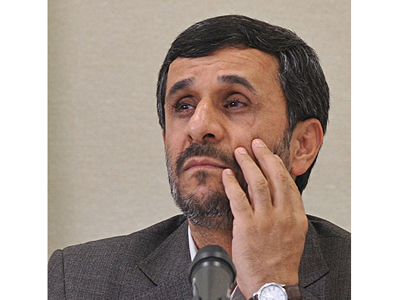Would Haass and Levi Accept Their Own Proposed Deal?
Outlandish demands and unreasonable terms ensure that diplomacy with Iran remains a nonstarter.
 One of the more exasperating phenomena surrounding the question of “diplomacy” with Iran is that many of the people proposing diplomatic offers have outlandish suggestions for the contours of a negotiated settlement on the nuclear issue. The latest offering comes in Wednesday's Wall Street Journal, courtesy of Richard Haass and Michael Levi of the Council on Foreign Relations.
One of the more exasperating phenomena surrounding the question of “diplomacy” with Iran is that many of the people proposing diplomatic offers have outlandish suggestions for the contours of a negotiated settlement on the nuclear issue. The latest offering comes in Wednesday's Wall Street Journal, courtesy of Richard Haass and Michael Levi of the Council on Foreign Relations.
Before the criticism, though, a bit of praise: Haass and Levi concede at the outset that
Iran will not do away with its nuclear program, which is simply too extensive and enjoys too much political support among Iranians. No Iranian government could forfeit the “right to enrich” and survive.
This is a refreshing and welcome reality check for the foreign-policy fantasists in the United States Senate, whom Paul Pillar has rightly criticized in these pages.
Setting that aside, however, the Haass/Levi proposal is almost certain to fail. The essential dilemma of U.S.-Iran diplomacy is that anything our domestic politics permits will fail and anything that might not fail is impossible because of our domestic politics. (If pressed, I am enough of a realist to guess that, even in a perfectly permissive domestic political environment, any deal we could offer would not be accepted and adhered to by Iran, for the simple reason that they have little reason to trust us.) Robert Wright has a useful rundown on some of the domestic political constraints at the Atlantic.
But despite not demanding outlandish things like foregoing any enrichment or ending any ballistic-missile programs, for all Haass and Levi’s recognition that either another Middle East war or a nuclear Iran would be a mess, they don’t propose a particularly irresistible set of enticements to Tehran. To wit:
the world should offer to dial back the most recent sanctions (including those not yet fully implemented) that target the Iranian oil and financial sectors. But no existing sanctions should be eased (or new sanctions delayed) as a reward for Iran's agreeing to talk, lest negotiations prove to be nothing more than a tactic. And sanctions aimed at firms and individuals involved in illicit nuclear activities—particularly those associated with military efforts—would need to stay. So, too, would other sanctions prompted by Iranian violations of human rights, support for terrorism, and threats to regional security beyond its nuclear program.
It is definitely sensible to insist that sanctions on illicit nuclear activities should remain in place, but the rest of this seems certain to produce little more than a yawn and a backhanded wave from Tehran. The paragraph is a bit confusing, but it seems like the ultimate payoff here is that the recent financial and oil sanctions would be lifted if the diplomatic process produced fruit. The phasing-in question is important here—maybe the most important piece. And what Haass and Levi suggest the the United States, with a much stronger negotiating position than Iran, should offer up front isn’t clear. Given the constant threats against Iran, if I were sitting in Tehran, I wouldn’t view this as a deal worth taking. There’s reason to believe that Ehud Barak wouldn’t take it, either.
So perhaps it bears asking of Haass and Levi, as well as all advocates of diplomacy with Iran: If the situation were reversed, would you take the deal you’re suggesting the United States should offer?
Image: Marcello Casal Jr\ABr
